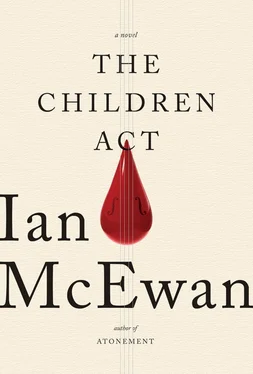In moments of disillusion with due process, she only needed to summon the case of Martha Longman and Runcie’s lapse to confirm a passing sense that the law, however much Fiona loved it, was at its worst not an ass but a snake, a poisonous snake. Unhelpfully, Jack took an interest in the case and when it suited him, when things weren’t well between them, loudly loathed her profession and her implication in it, as if she herself had written the judgment.
But who could defend the judiciary once Longman’s first appeal was rejected? The case was a sham from its inception. The pathologist, so it turned out, unaccountably withheld crucial evidence about an aggressive bacterial infection in the second child. The police and Crown Prosecution Service were illogically keen for a conviction, the medical profession was dishonored by the evidence of its representative, and the entire system, this careless mob of professionals, drove a kindly woman, a well-regarded architect, toward persecution, despair and death. In the face of conflicting evidence from several expert medical witnesses about the causes of the infants’ deaths, the law stupidly preferred a guilty verdict over skepticism and uncertainty. Runcie was, everyone agreed, an extremely nice fellow, and, the record showed, a good hardworking judge. But when Fiona heard that both the pathologist and the doctor were back at work, she couldn’t help herself. The case turned her stomach.
Runcie was raising a hand in greeting and there was no choice but to stop in front of him and be affable.
“My dear.”
“Good morning, Sherwood.”
“I read a wonderful little exchange in Stephen Sedley’s new book. Just your thing. It’s from a Massachusetts trial. A rather insistent cross-examiner asks a pathologist whether he can be absolutely sure that a certain patient was dead before he began the autopsy. The pathologist says he’s absolutely certain. Oh, but how can you be so sure? Because, the pathologist says, his brain was in a jar sitting on my desk. But, says the cross-examiner, could the patient still have been alive nevertheless? Well, comes the answer, it’s possible he could have been alive and practicing law somewhere.”
Even as Runcie exploded into hilarity at his own story, his eyes were fixed on hers, gauging whether her mirth would match his own. She did her best. Jokes against the legal profession were what the legal profession loved most.
At last, installed behind her desk with her now lukewarm coffee, contemplating the matter of a child removed from the jurisdiction. She pretended not to notice Pauling on the other side of the room as he cleared his throat to say something, then thought better of it and vanished. At some point, her own concerns also vanished as she forced her attention on the submissions and began reading at speed.
The court rose to her on the stroke of ten. She listened to counsel for the distressed mother, applying to retrieve her child through the Hague Convention. When the Moroccan husband’s counsel got to his feet to persuade Fiona of some ambiguity in his client’s assurance, she cut him off.
“I was expecting to find you blushing on behalf of your client, Mr. Soames.”
The matter was technical, absorbing. The thin frame of the mother remained partly hidden behind counsel, and seemed to shrink further as the arguments became more abstract. It was likely that when the court rose, Fiona would never see her again. The sad affair would come before a Moroccan judge.
Next, she heard an urgent application on behalf of a wife seeking maintenance pending suit. The judge listened, she asked questions, she granted the application. At lunchtime she wanted to be alone. Pauling brought her sandwiches and a bar of chocolate to eat at her desk. Her phone lay under some papers, and at last she gave in, scanned the screen for texts or missed calls. Nothing. She told herself she felt neither disappointment nor relief. She drank tea and allowed herself ten minutes to read the newspapers. Mostly Syria, reports and lurid photographs: the government shelling civilians, refugees on the road, impotent condemnations from foreign ministries around the world, an eight-year-old boy on a bed, left foot amputated, weak-chinned etiolated Assad shaking hands with a Russian official, rumors of nerve gas.
There was far greater misery elsewhere, but after lunch she confronted more of the local kind. She was dismissive of an ex parte application for an order excluding a husband from the matrimonial home. The presentation was protracted; the owlish counsel’s nervous blink irritated her further.
“Why are you doing this without notice? I see nothing in the papers that would make that necessary. What communication have you tried to have with the other side? None, as far as I can see. If the husband’s happy to give an assurance to your client, you really shouldn’t be bothering me with this. If he isn’t, then serve notice and I’ll hear both sides.”
The court rose, she stalked out. Then back to hear argument for and against a prohibitive-steps order on behalf of a man who said he feared violence from his ex-wife’s boyfriend. Much legal argument about the boyfriend’s prison record, but it concerned fraud, not assault, and finally she refused the application. An assurance would have to do. A cup of tea in her room, then back again to hear a divorcing mother’s emergency application for her three children to have their passports lodged with the court. Fiona was minded to grant it, but after she heard argument about the aggravating complication that would follow, she refused.
Back in her room at five forty-five. She sat at her desk, staring blankly at her bookshelves. When Pauling came in, she started, and thought she may have been asleep. He let her know that press interest in the Jehovah’s Witness case was now strong. Most of tomorrow morning’s papers would carry the story. On the press websites there were pictures of the boy with his family. The parents themselves may have been the source, or a relative grateful for some quick cash. The clerk put in Fiona’s hands the papers for the case and a brown envelope which clinked mysteriously as she unsealed it. A letter bomb from a disappointed plaintiff? It had happened before, when a device, clumsily assembled by an enraged husband, failed to explode in the face of her then clerk. But yes, her new keys, opening the way to her other life, her transformed existence.
And so, half an hour later, she set off toward it, but by a circuitous route, for she was reluctant to enter the empty apartment. She left by the main entrance and walked west on the Strand to the Aldwych, then went north along Kingsway. The sky was battleship gray, the rain barely noticeable, the Monday rush-hour crowds lighter than usual. In prospect, another one of those too long, dim summer evenings of low cloud. Total darkness would have suited her better. When she passed a key-cutting shop, she made her heart beat harder imagining a shouting row with Jack about the lockout, face-to-face in the square under the dripping trees, overheard by neighbors, who were also colleagues. She would be entirely in the wrong.
She turned east, passed the LSE, skirted Lincoln’s Inn Fields, crossed High Holborn, then, to delay her arrival home, went west again, down narrow streets of mid-Victorian artisanal workshops, now hairdressers, lockups, sandwich bars. She crossed Red Lion Square, past empty wet aluminum chairs and tables of the park café, past Conway Hall, where a small crowd was gathered waiting to go in, decent, white-haired, careworn people, Quakers perhaps, ready for an evening of remonstration with things as they stood. Well, she had her own such evening ahead. But to belong to the law and all its historical accumulation bound one closer to things as they stood. Even as you resisted or denied it. More than half a dozen embossed invitation cards lay on a polished walnut table in the hallway at Gray’s Inn Square. The Inns of Court, the universities, charities, various royal societies, eminent acquaintances, calling on Jack and Fiona Maye, themselves crafted through the years into a miniature institution, to step out in public in their best clothes, lend their weight, eat, drink, talk and return home before midnight.
Читать дальше












